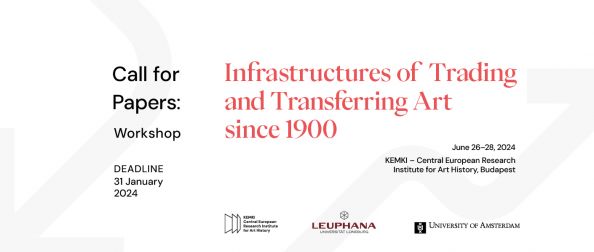CFP: Infrastructures of Trading and Transferring Art since 1900
Workshop - Call for Papers
Although art market studies as an academic field has become increasingly popular in the last decade, there has been little research that critically examines the actors, places, rules, and structures of this system. This workshop aims to explore the infrastructures through which artworks have been produced and exchanged for goods, money, services, and reputation since 1900.
Our focus is not only on the dominant and well-known structures of the art market but also on alternative practices in specific times and places and under various regimes. Proposals may relate but are not limited to the following topics and can present arguments based of case studies or an overarching thesis:
- Actors and networks for transferring and trading art, such as auction houses, dealers, galleries, museums, art societies, artists’
networks or collectives, dealer and/or collector consortia, laymen; - Locations and platforms for trading and transferring art, such as
museums, freeports, hotels, apartments, fairs, and online platforms; - State involvement in trading and transferring art, such as commissioning monumental art/murals, guaranteed buying, soft
power cultural politics, censorship; - Communication for trading and transferring art, such as art critique
or catalogue raisonné writing by dealers, advertisement or PR; - Logistics and shipping of trading and transferring art
- Finances of trading and transferring art, such as collateralization
or tax deduction; - Illicit or unethical trading and transferring of art such as unprovenanced and/or looted objects, forgeries, insider trade.
We particularly welcome proposals that deal with transnational perspectives, uneven exchanges, differences or systems in centres and peripheries, dynamics of innovation and “belatedness,” selection and canon formation, including aspects of gender, diversity, and discrimination. Apart from emerging and senior scholars in academia, we also invite professionals in related fields. The workshop is part of the research initiative (Un)mapping Infrastructures: Transnational Perspectives on Modern Art, which aims to publish selected outcomes and contributions of the workshops in an edited series.
Organized by
Gregor M. Langfeld (University of Amsterdam/Open University, Netherlands)
Kristóf Nagy (KEMKI – Central European Research Institute for Art History, Hungary)
Lynn Rother (Leuphana University Lüneburg, Germany)
Call for Proposal:
Please submit an abstract of max. 300 words and a 1–2 page CV to:
artmarketsince1900@gmail.com
Deadline: 31 January 2024.
Speakers will be informed by 11 February 2024.
Dates of the Workshop: June 26–28, 2024.
Location of the Workshop: KEMKI – Central European Research Institute for Art History
(Szabolcs street 33–35, 1135 Budapest, Hungary).
The workshop will be held on-site. To support researchers who cannot travel, a very limited number of papers may be presented in online sessions. We will submit grant proposals to support travel and accommodation costs.
